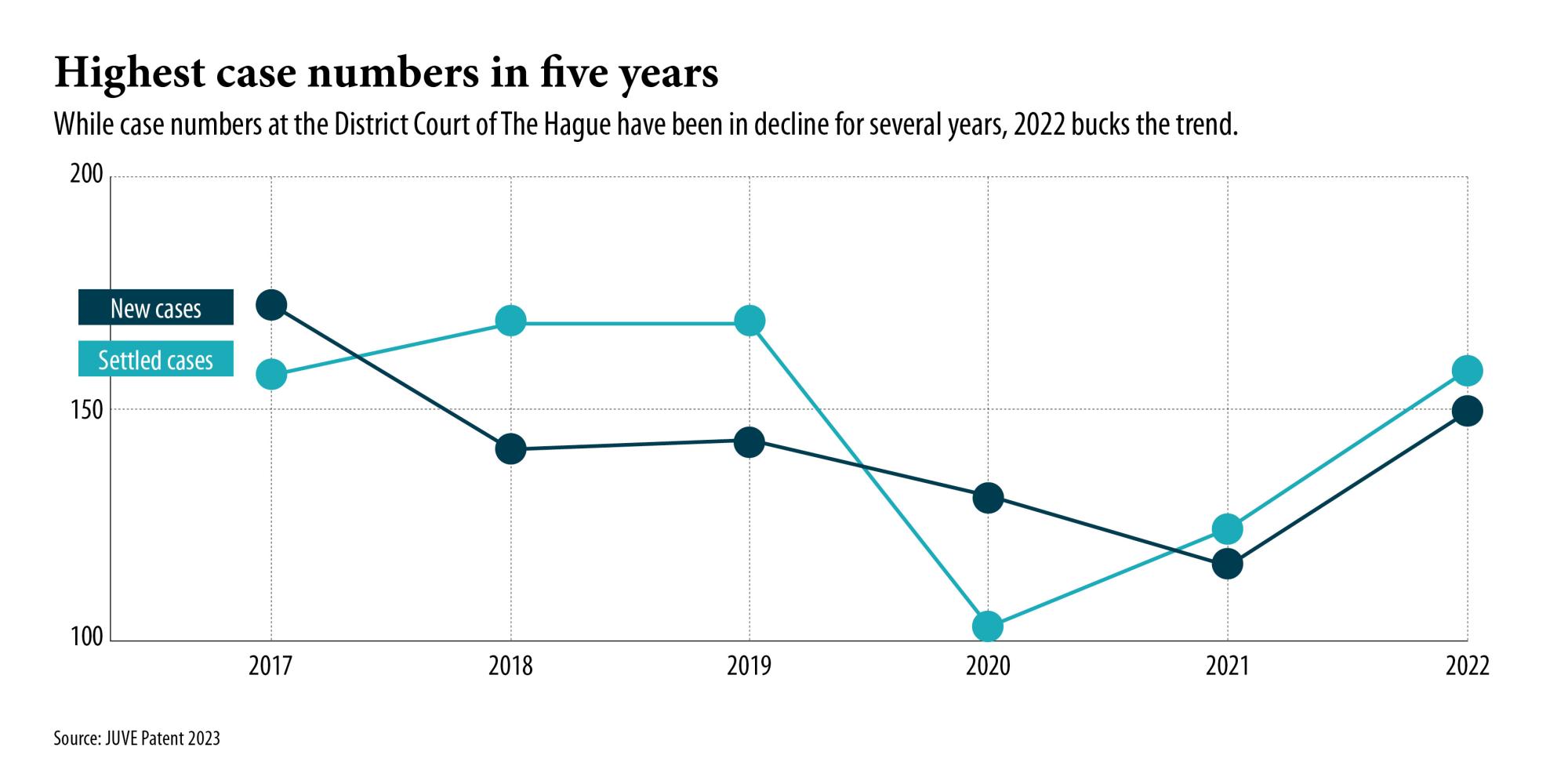The Hague cements reputation for complex patent disputes as case numbers rise
For the first time since 2019, the District Court of The Hague recorded growing numbers of newly filed patent cases in 2022. Compared to the previous year, the number of cases filed by parties increased by more than 28%. Now, with four of its judges set to work at the UPC, the jurisdiction remains at the forefront of cross-border patent litigation.
12 April 2023 by Konstanze Richter
Case numbers at the court of the Netherlands’ main patent jurisdiction of The Hague are rising. In total, plaintiffs filed 149 new patent cases at the District Court of The Hague in 2022. This is in contrast to the previous year, where the court had received only 116 new cases. Furthermore, the number of settled cases also increased significantly by over 27%. Whereas in 2021, parties brought 124 actions to a conclusion, in 2022 the number of settled actions was 158.
The Hague, a patent forum
As in many other countries, the Netherlands had experienced a trend toward fewer new patent lawsuits in recent years. While this was still at 172 proceedings in 2017, the number reached a record low of only 116 in 2021. The situation is similar for settled cases, which fell from 157 six years ago to 124 last year. Only the first COVID-19 year of 2020 superseded this lower figure, when litigating parties concluded just 103 cases.

It is therefore all the more surprising that, as in France, the number of both newly filed and settled cases increased by well over a quarter compared with the previous year.
While the District Court of The Hague is the usual forum for patent actions in the Netherlands, the District Court of Amsterdam also hears some patent-related cases. The court is mostly responsible for commercial disputes.
DivX, for example, brought its action against Netflix concerning unlawful acts before the capital’s court, because the city is home to the US streaming provider’s EMEA headquarters. An unlawful act claim also underpins the dispute between Cook and Boston Scientific. Although this was heard in Amsterdam, the presiding judge was Edger Brinkman from the District Court of The Hague. In the dispute concerning Synthon against Teva, the Amsterdam Court of Appeal ruled on jurisdiction of the Dutch court in a cross-border case.
UK an outlier
While The Hague is enjoying an upturn in cases, the UK is experiencing the opposite. In the past few weeks, JUVE Patent reported on figures showing that the number of new patent cases being filed at the first-instance High Court is continuing to decline. According to civil justice statistics, 2022 saw just 35 new patent actions, a 30% decrease compared to the previous year. In 2021, companies filed 50 new lawsuits; even in the COVID-19 year of 2020, the court counted 52 newly filed cases.
On the other hand, the UK judges are experiencing a higher workload than ever. This is partly down to parties filing many more complex cases than before, especially in the field of telecommunication, pharmaceuticals, and medical devices. Additionally, proceedings in London tend to involve several patents from one family as well as numerous defendants, for which the court schedules several hearings.
Recent examples include the technical and FRAND-related trials between InterDigital and Lenovo, and the court’s recent decision in the “robot wars” between AutoStore and Ocado. In both cases, multiple patents were at stake.
Four judges for UPC
Back on mainland Europe, however, and The Hague remains the court with jurisdiction for some of the most complex patent infringement proceedings. Last year, these included disputes in the telecommunication sector, such as Nokia against Oppo or Apple against Ericsson, as well as in pharmaceutical disputes including Pharmathen vs. Novartis over cancer drug Okrodin. The court also hears cases concerning medical devices, such as Advanced Bionics against MED-El over a cochlear implant.
Opponents from other technology sectors, such as energy, have also sued before the District Court of The Hague. A prime example is Hanwha Q-Cells in its battle against Longi over solar panels.
Unsurprisingly, the District Court of The Hague’s experienced judge will also be very present at the UPC. While the pan-European court has appointed Edger Brinkman and Margot Kokke to the city’s local division, appeal judges Rian Kalden and Peter Blok will lead the UPC Court of Appeal proceedings.
In the race to host the former London UPC central division The Hague officially dropped out last summer, leaving Milan as the only contender. In a report authored by the city’s local government and the Dutch branch of the International Association for the Protection of Intellectual Property, it was estimated that the central division seat would bring €191 million into The Hague annually.